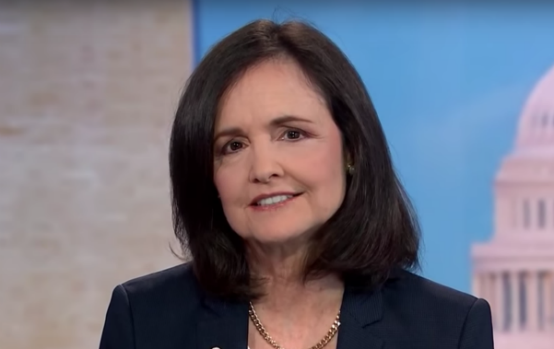
Credit: Bloomberg/YouTube Screenshot
With his oft-stated affinity for all things Russia, President Donald Trump may be surprised to learn that his new Federal Reserve Board nominee made an early name for herself by shorting the Kremlin. As a young researcher and first-time author, Dr. Judy Shelton predicted the coming collapse of the Soviet Union two years before the tanks and human rights protesters converged on Red Square. And while her views on communist economics might not seem timely at the moment, they’re actually quite prescient.
In 1984, Dr. Shelton was investigating global levels of debt at the Hoover Institution during a period in which the Soviet Union was vigorously seeking sources of international credit. The Soviets borrowed money from Western banks; they also sought to join the International Monetary Fund and World Bank. Shelton noted how this behavior seemed at odds with a supposedly self-sufficient economic system, which the Kremlin claimed generated reliable surpluses year after year.
While American satellites tracked everything from Russian aircraft carriers to missile pads, Shelton sharpened her pencils and scrutinized the Russian government’s accounting. She meticulously produced her own estimate of the true deficits and debt being accumulated by the Soviet Union. Her research led to a publishing deal, and in the resulting book, she showed how the USSR had actually been running annual deficits of tens of billions of U.S. dollars.
That book, The Coming Soviet Crash, published in 1989, comprehensively demonstrated how the Politburo had been misrepresenting the government’s financial position for years by using accounting gimmicks to produce “surpluses” that existed only on paper.
“The Soviet Union has been engaged in deficit spending for as long or perhaps longer than the United States has,” one book reviewer noted, “but with fewer resources, a lesser commitment to solving the problem, and a deeply entrenched bureaucracy that is unwilling even to admit there is a problem, let alone cure it.”
Western economists had long suspected that the Soviets were massaging their publicly released figures for propaganda purposes, to falsely highlight the productivity of the centrally planned and state-administered economy. But when it came to the true deficit amounts, as Sheldon said, “people [had] generally felt it was about half what we suddenly learned that it truly was. The numbers were so bad.”
Three decades have passed since the original publication of The Coming Soviet Crash, and Shelton may now be in a position to write a sequel. Many state and local governments have been claiming budget “surpluses,” while simultaneously accumulating massive debts. The federal government’s reported deficits similarly mask the magnitude of true debt accumulation—and to a greater degree than the totals for state and local governments.
Consider that 49 of the 50 states have some form of “balanced budget” requirement, either in their constitutions or by statute. A budget is said to balance when spending is in line with or below revenue, and debt doesn’t grow over time. Yet Truth in Accounting estimates that the 50 states had accumulated about $1.1 trillion in unfunded debt obligations by 2009, and that amount actually grew to more than $1.5 trillion by 2017 despite the recovery from the Great Recession.
In turn, we have calculated that the federal government’s true budget deficits have been running about four times higher than the officially reported numbers ($779 billion in 2018) once you consider the accumulation of off-balance sheet debt for social insurance programs. We think that off-balance sheet debt should be counted in the national debt, which would increase it to more than $100 trillion compared to the official $22 trillion figure.
A central bank serves not only as a bank for banks, but also as a bank for the government. Whatever your views about Judy Shelton’s economic philosophy, it will be valuable to have a central banker with experience digging for the truth about opaque state finances.
Bill Bergman is director of research at Truth in Accounting, a Chicago nonprofit dedicated to educating citizens about government financial conditions with a view to promoting truthful, timely, and transparent financial reporting. Bill has more than 30 years of financial market experience, including 13 years as an economist and policy analyst with the Federal Reserve Bank of Chicago. Bill also teaches finance courses at Loyola University Chicago.
Read More
the-american-conservative
